Lukman Abdulmalik
About 300 primary healthcare centers (PHCs) and clinics provide medical services to 44 local government areas (LGAs) in Kano State. Almost every year, the state government celebrates its accomplishments in the health sector, especially with Primary Health Care Centers (PHCs), even as residents still suffer from poor access to basic healthcare.
A Kano budget performance review shows that the state recorded only 18% budget execution for its health ministry between 2021 and the first quarter of 2024.
That is despite the fact that the state government spent its highest amount for the health sector in 2023, when the sum of N26.3 billion (44.7%) was expended out of the N59 billion budgeted.
In 2022, the Kano State Primary Healthcare Management Board (KSPHMB) awarded the sum of N90.1 million to Dankwadoko Company Limited to renovate and maintain PHCs in the state.
Yet, rather than improving, most PHCs in the state have deteriorated as residents endure difficult health situations, including fatalities due to poor facilities and services.
In this report, Lukman Abdulmalik documents the substandard state of PHCs in Kumbotso, Warawa, and Kunchi; and also exposes a state-wide violation of the Public Procurement Law by the Kano Primary Healthcare Management Board.
Poor PHCs in Kumbotso LGA
Zara village is a remote and hard-to-reach community in the Kumbotso Local Government Area (LGA) of Kano State. It hosts a small and dilapidated Primary Health Care Centre (PHC), which has a gaping ceiling in almost every room.
The facility has been in very bad condition for over five years. And, for the residents, accessing basic healthcare is both arduous and expensive because they have to travel from their community to the capital city, Kano, about 18 kilometers away, where the government-owned Murtala Muhammad Specialist Hospital, the main option for specialized care, is located.
Many women in Zara, especially those who are pregnant, are often deterred from seeking prenatal treatment at the distant specialist hospital, due to the high cost of transportation to Murtala Muhammad Specialist Hospital, with a return fare of about N1,500.
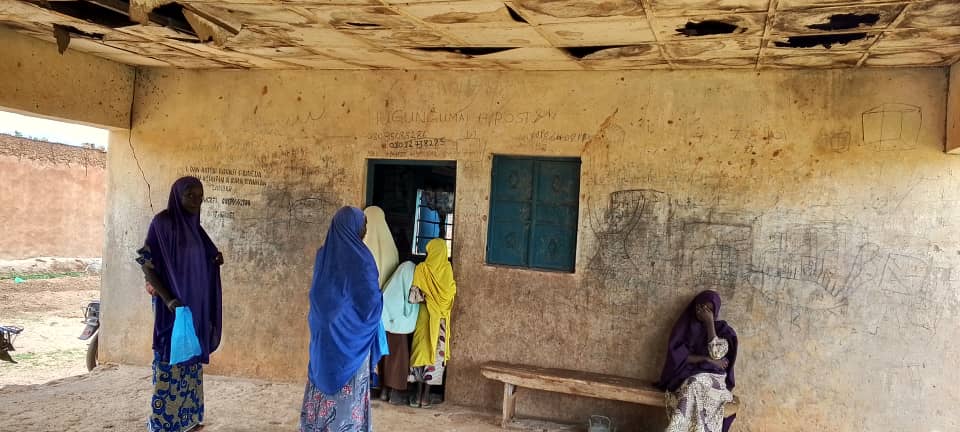
The village’s patent medicine store, referred to locally as the “chemist,” is the most reliable option for residents of the settlement and those of nearby communities. Zara Health Centre, aside from its very poor physical state also lacks the most basic amenities and medicines, a situation made even worse by the absence of medical staff, particularly in the evenings and at night.
According to Hasiya Haruna, 45, a mother of five, the Zara health center is like “an abandoned building. Whenever we have serious emergency issues, we either take our patients to a private clinic or Murtala Muhammad General Hospital.”
Usman Na’ina, 57, father of 8 lamented that the bad condition of Zara PHC is costing him a lot in out–of–pocket spending.
“Yesterday, two of my children were suffering from malaria but the PHC had no drugs to administer to my children. I have to spend N14,200 to treat them at a private chemist in Panshekara which is about five kilometers away,” he recalled.
“Apart from the medication cost I have to spend N500 daily to take my children for injection in the evening hours.”
Abdullahi Aminu, Village Head of Zara lamented that their PHC is not operating up to standard.
“Patients who come to this facility for care are frequently treated in poor surroundings, with leaking roofs and no restrooms. Patients’ dignity is violated in these appalling conditions, and there are major health hazards as well.”
Just like the Zara facility, Garu Primary Health Center, also in Kumbotso LGA, has been in a dilapidated state for over a decade, lacking basic amenities and services.
Umar Habibu, a 66-year-old resident of Garu revealed that about 25 women between the ages of 22 and 55 were victims of maternal mortality in the community between January 2022 and December 2024, including Umar’s 45-year-old wife, who died during childbirth.
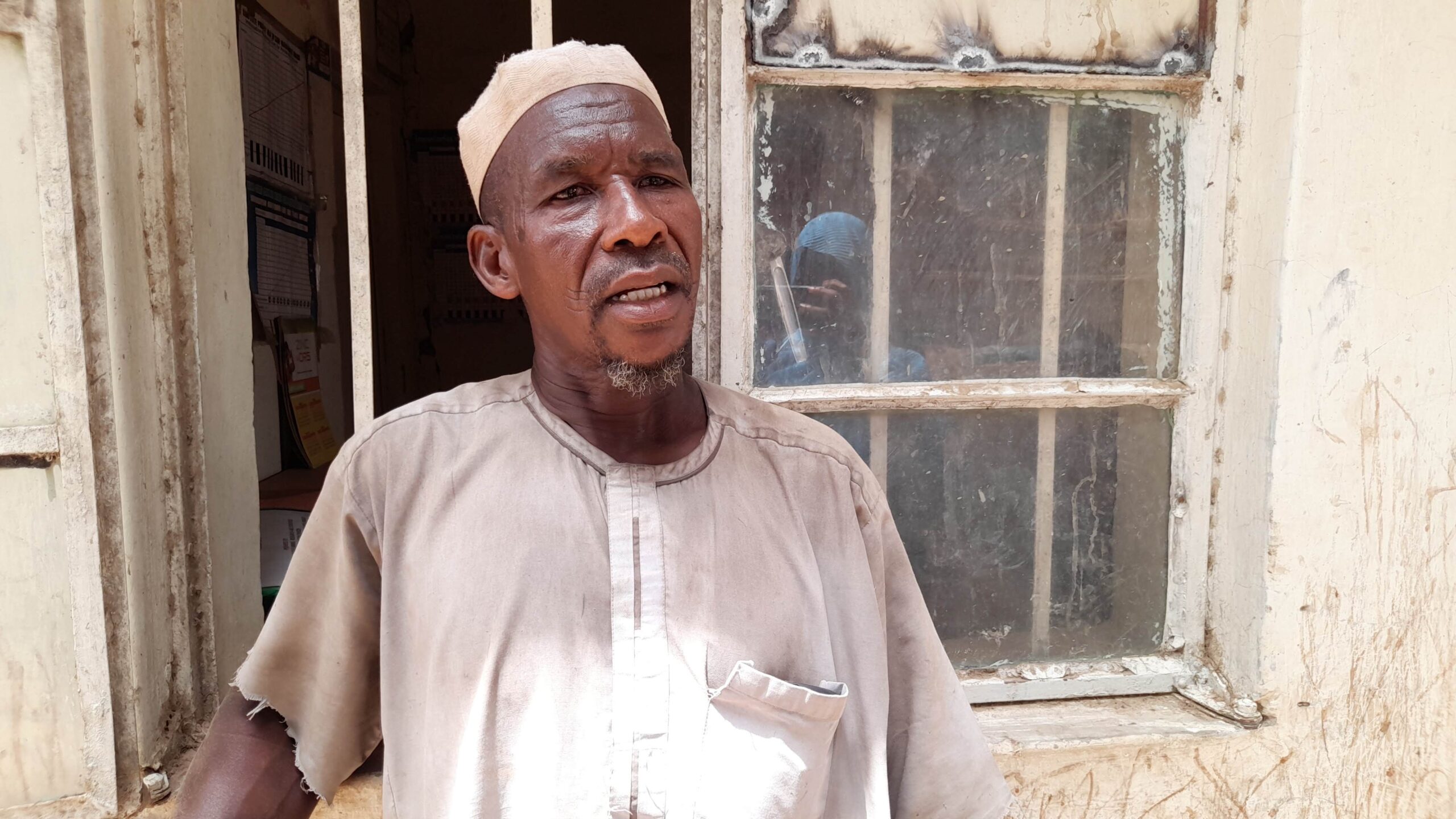
“We had to make the agonizing trek of almost 14 kilometers to Kano town to receive medical attention. My wife suffered the unforgiving travails of childbirths on the road and her life was cut short before reaching the hospital” he lamented.
Musa Nura, 32, father of three decried that the non-functioning of their PHC is causing so many residents to embrace traditional healing methods, including pregnant women who increasingly patronize traditional birth attendants.
He said “For instance when my wife was about to give birth in August 2023, she was at the point of delivering, so due to her condition I could not drive her far to Murtala Muhammad or Aminu Kano Hospital due to the bad road at that time.
“I have no option than to call a traditional birth attendant to help my wife deliver her child because I do not have the funds to patronize private clinics.”
Data indicate that Kano State has since 2020 allocated up to 15% of its budget to healthcare. Further, the state has also introduced innovative funding mechanisms such as the State Health Trust Fund and the Kano State Contributory Health Care Management Agency (KSCHMA).
KSCHMA is a social health program system of advance financing of health expenditure through contributions, donations, grants, or taxes paid into a common pool to pay for all or part of health services as specified by the state law.
Yet, healthcare delivery remains very poor, especially among PHCs in rural areas.
Kunchi Woes
Just as with Zara and Garu, the Karofawa community in Kunchi LGA, bears its primary healthcare woes. It is the same tale of dilapidation at the Karofawa facility going back several years, so much so that residents barely rely on it for the most basic health support.
The physical neglect is such that the building had cracked ceilings that leak badly whenever it rains. The facility also lacks toilets as patients practice open defecation.

Usman Bala, 30, a resicdent told our reporter that most people in Karofawa and neighboring villages “drive to Bichi (25 kilometres) or Kazure in Jigawa, which is over 48 kilometres away, for their healthcare needs, because relying solely on their PHC may inevitably lead to death.
“We have only one doctor who takes care of the PHC from Monday to Friday which he opens from 9:am to about 2:pm.
On Saturday and Sunday, the PHC remains locked. So, in case of an emergency, we have to travel far,” he explained.
On 23 July 2024, around 2:16 pm, when this reporter arrived at the facility, it had already closed and all of the staff had left for the day.
Despite its appalling condition and very bad networks of roads to access it, the neighboring communities of Tigali, Tibi, Tashar Mai Unguwa, and Center Dole primarily rely on the Karofawa PHC for their healthcare needs.
Yet, the Nigeria Health Facility Registry set the minimum standards for primary healthcare facilities in Nigeria for a minimum of eight hours every day.
As stated in the document, primary healthcare should have human resources for PHC which include; Community Health Officer (CHO), Nurse/Midwife, Community Health Extension Worker CHEW), and Junior Community Health Extension Worker (JCHEW).
According to the Nigerian Health Facility Registry, a PHC should have a minimum land area of 2,475 square meters which would cover 2,000 to 5,000 people.
It stated that a PHC should be a detached building with at least 5 rooms, walls and roof must be in good condition with functional doors and netted windows.
Functional separate male and female toilet facilities with water supply within the premises with at least a motorized borehole.
A PHC should be connected to the national grid and other regular alternative power sources. Also Have a sanitary waste collection point, a waste disposal site, and a clearly signposted visible from both entry and exit points.
The document also stated that a PHC must be fenced with gate and generator houses, and staff accommodation provided within the premises: 2-bedroom apartments.
The building must have sufficient rooms and space to accommodate clients, an observation area, consulting area, delivery room, first stage room, an injection and dressing area, lying-in ward (4 beds), pharmacy section, record section, staff station, store, toilet facilities (or VIP Toilet) and waiting/reception area.
Despite these criteria, PHCs in Kano are yet to meet the requirements for minimum standards for primary healthcare facilities.
Similarly, the Yandadi PHC in Kunchi LGA suffers from understaffing, outdated medical equipment, dilapidated infrastructure including leaky roofs, lack of essential medications, and inadequate restrooms, among others. Not only do patients get subpar care, but the appalling conditions pose health hazards to them.
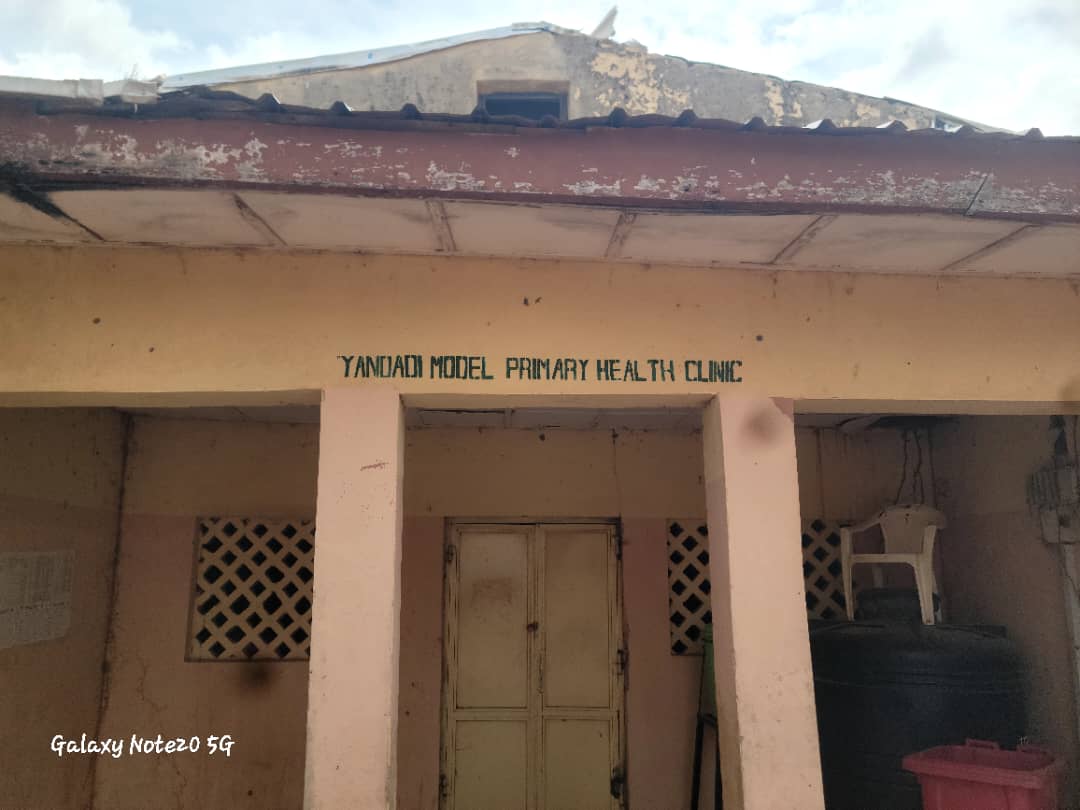
Abubakar Sagir, a volunteer staff member said that the facility has no water at all.
“Sometimes we bought sachet water or trek a kilometer away to fetch water. So, early in the morning, the hospital must make sure it has reserved water in case of emergency.
He further revealed, “We also do not have toilets, the ones we had are not functioning as most of them are dilapidated and damaged. For over four years, the PHC’s soak away has been submerged and has not been fixed”, a claim the reporter observed himself.
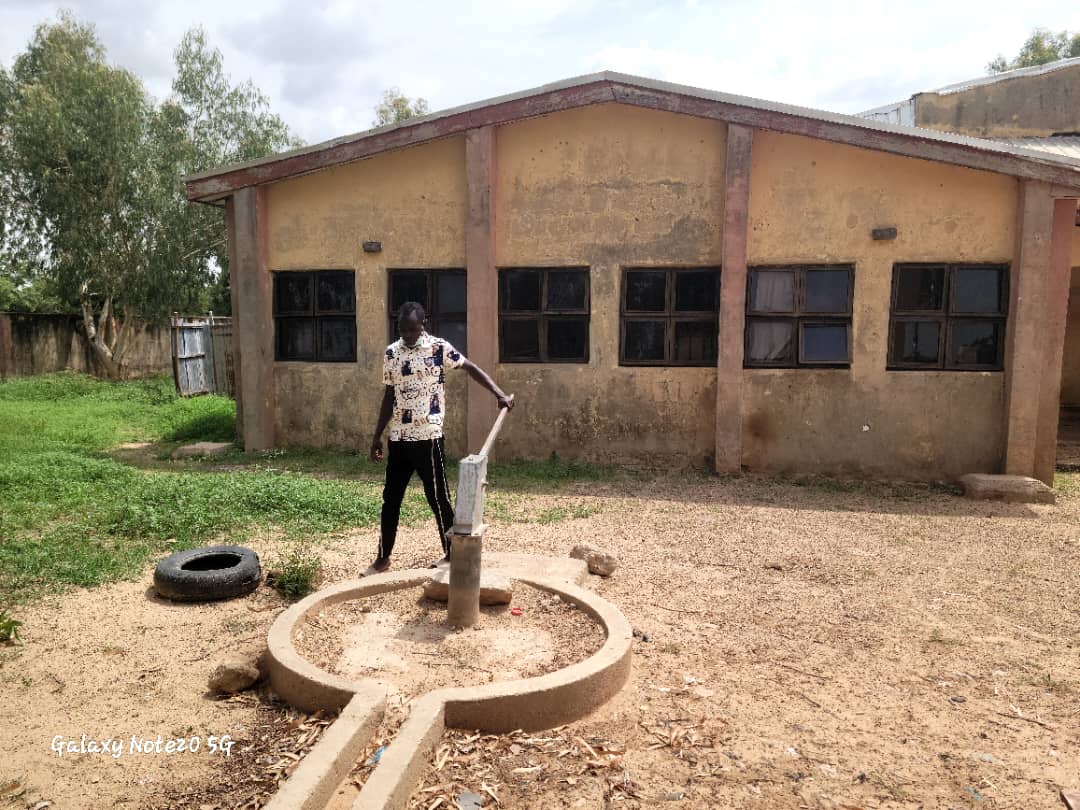
PHCs in Imawa Suffering Neglect
The same dilapidation and abandonment were evident at the Imawa PHC in Warawa Local Government when our reporter visited around noon on 10th July 2024. In fact, the facility was locked with no single healthcare worker around.
A resident, Khadija Bazallahi, 56, however, told him that most residents of the community “buy drugs from the local patent medicine stores (chemists), and if we require urgent attention, we go to Wudil (another LGA about 15 kilometers away) to receive care’’.
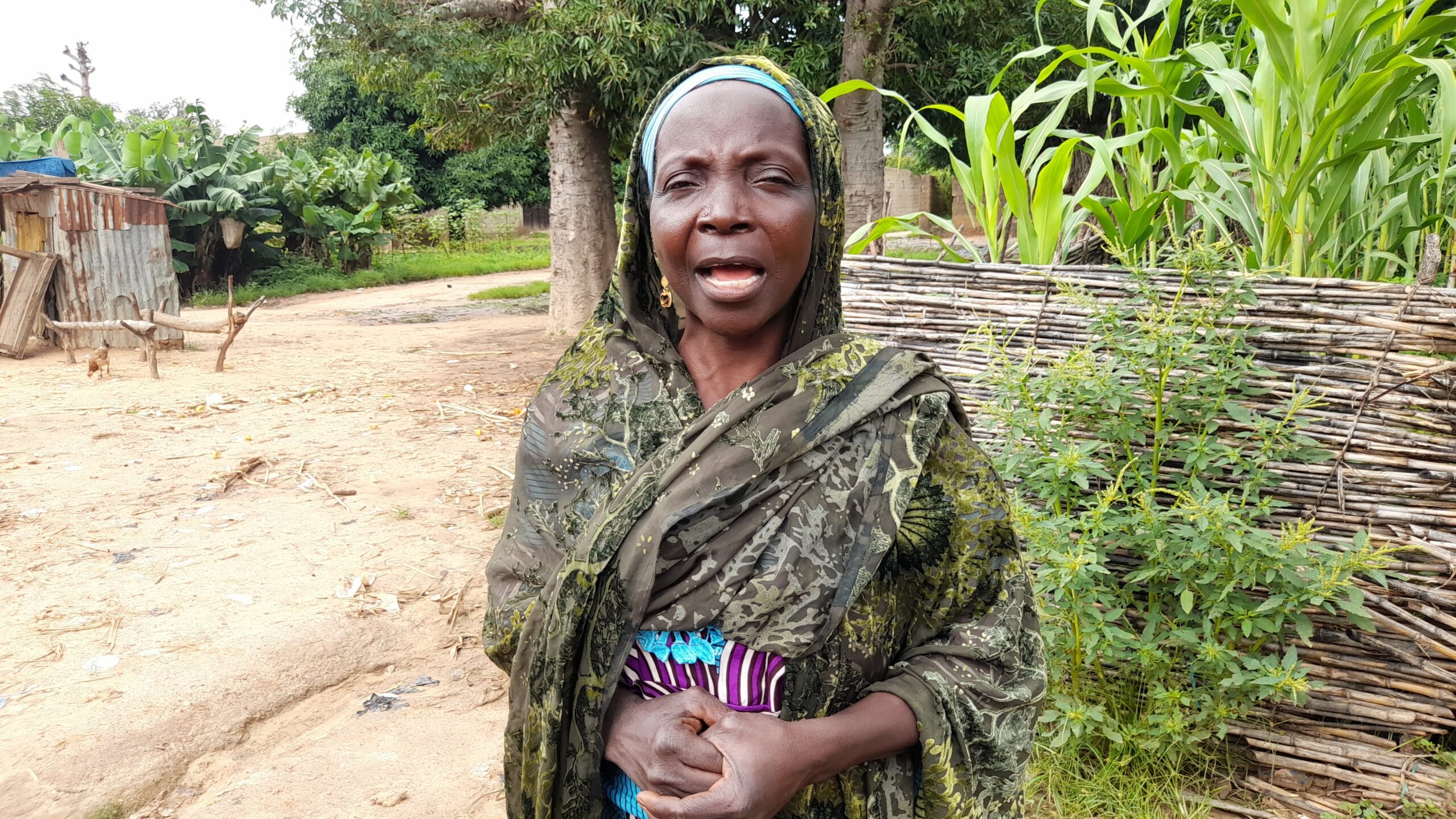
“This PHC does not always open”, she added ruefully. From the outside view, the PHC is visibly dilapidated without windows, zero restrooms, cracked walls and falling ceilings.
Even in that terrible state, Nasiru Magaji, the Officer-in-Charge (OIC) of the PHC said that the facility opens everyday but has lacked funds for well over a year to hire staff to run the facility.
The Imawa PHC, is another PHC in Warawa LGA with serious operational and structural issues that make it difficult for the community’s most vulnerable members to receive the vital services they need.
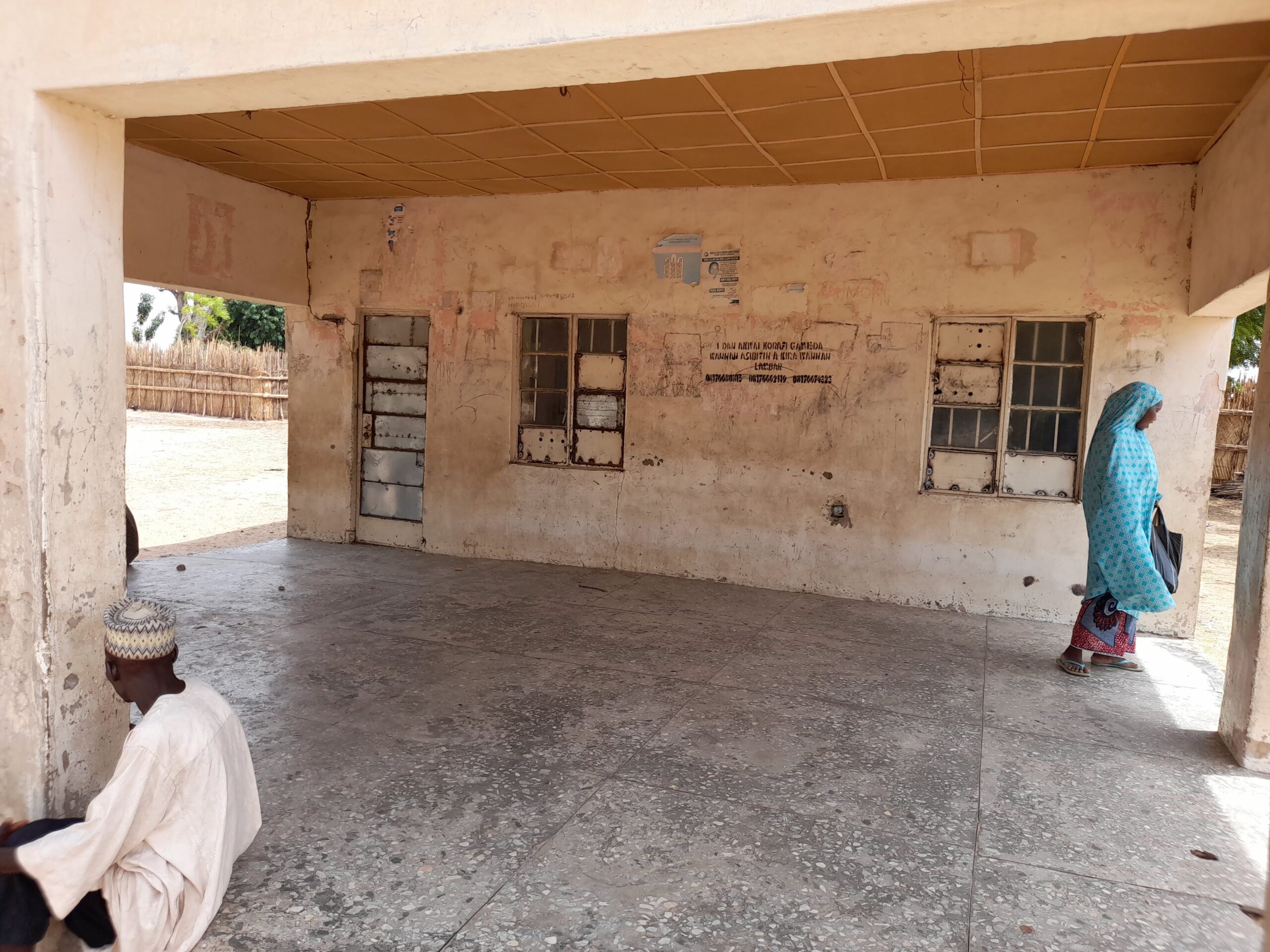
The Imawa PHC is abandoned to the extent that the compound has been converted into farmlands and a processing site for rice grains and the veranda a marketplace where young girls sold street food to farmers.
Balarabe Haruna, the Council Chairman agreed that the facility needs renovation and maintenance.
“Because of the bad condition of the PHC, it’s difficult for staff to stay, most especially during rainy seasons when the PHC usually becomes fully abandoned.
He claimed to have reached out in 2021 to the state government about the very poor condition of the facility but nothing was done.
Kabir Abdullahi, Village Head of Jigawa community, lamented that their PHC is so bad that sometimes you cannot get Panadol to cure headaches.
According to him, “Residents in this community prefer traveling to Wudil LGA which is about 22 kilometers or go far to Ringim in Jigawa State which is about 40 kilometers.
“But we hope this new administration should consider us and renovate our PHC.”
Nigeria’s National Primary Health Care Development Agency (NPHCDA) NPHCDA specifies that all functional PHCs should be built on 4,200 square meters and with at least 13 rooms, with good roofing, netted windows, functional toilets, clean water supply from a motorized borehole, a disposal site, staff accommodation, and be painted in green color.
None of the PHCs in Kano State visited by our reporter comes close to meeting these standards.
How Violation of Kano State Public Procurement Law Worsens the State’s Primary Healthcare Crisis
On May 6, 2022, a call for tender was placed on Kano State government’s E-procurement website calling for bids for a contract of maintenance and renovation of PHCs in the state.

A document our reporter accessed using a wayback machine under the https://kano-eproc.eurodyn.com revealed that on May 18, 2022, the Kano State Primary Healthcare Management Board (KSPHMB) awarded a contract at the sum of N90,100,000.00 million to one Dankwadoko Company Ltd, to renovate and maintain primary health care facilities in the state .
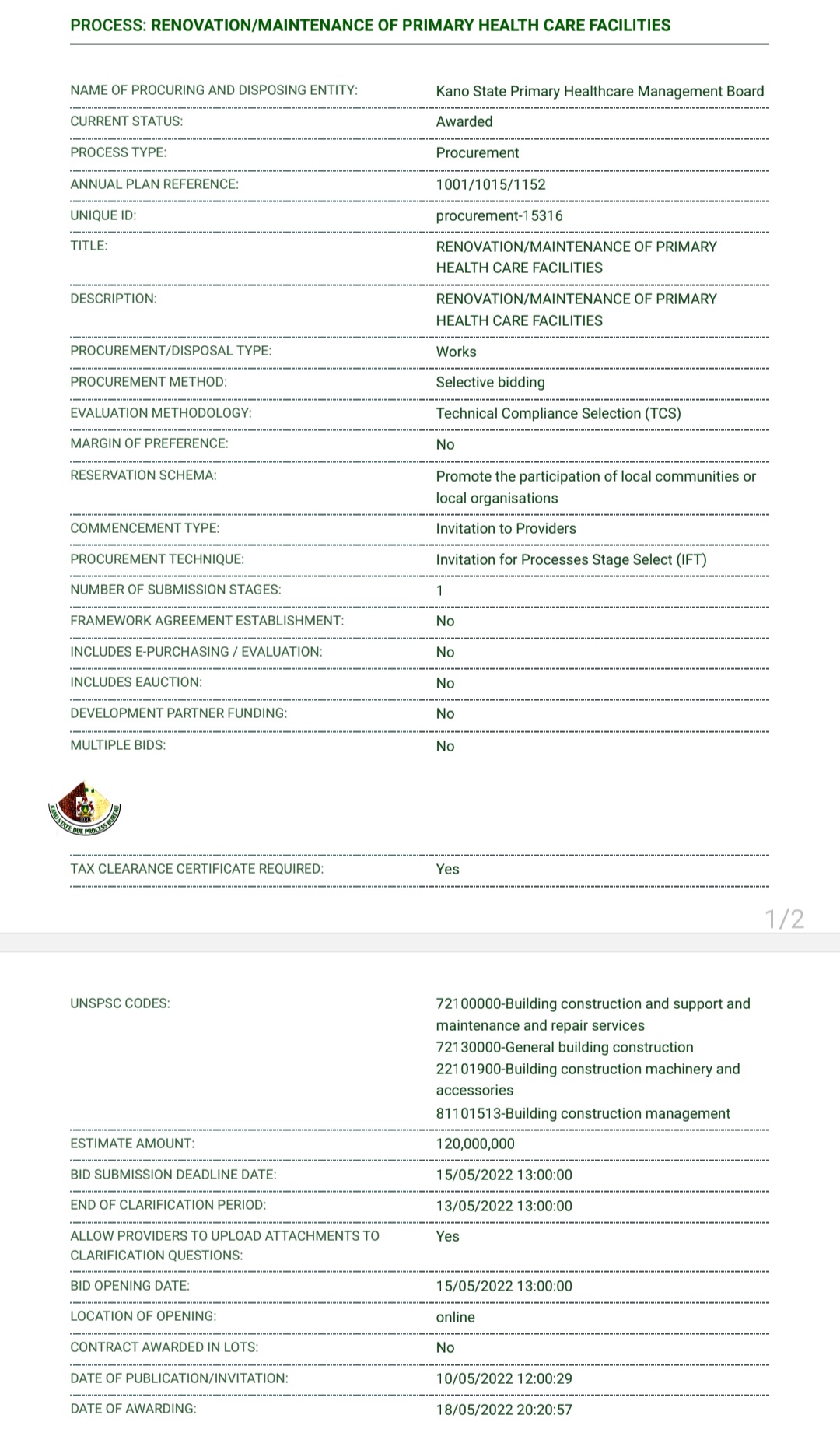
According to the document, the bidding adopted a national restricted approach featuring four companies- Absolue Consult Limited, Abidine Limited, Vagare Investment Limited and Dankwadoko Company Limited in which Dankwadoko emerged as the winner
The unsigned contract award notice featured the name of Bashir Sanusi as the Head of Procurement Department Unit (HPDU), of the KSPHMB.
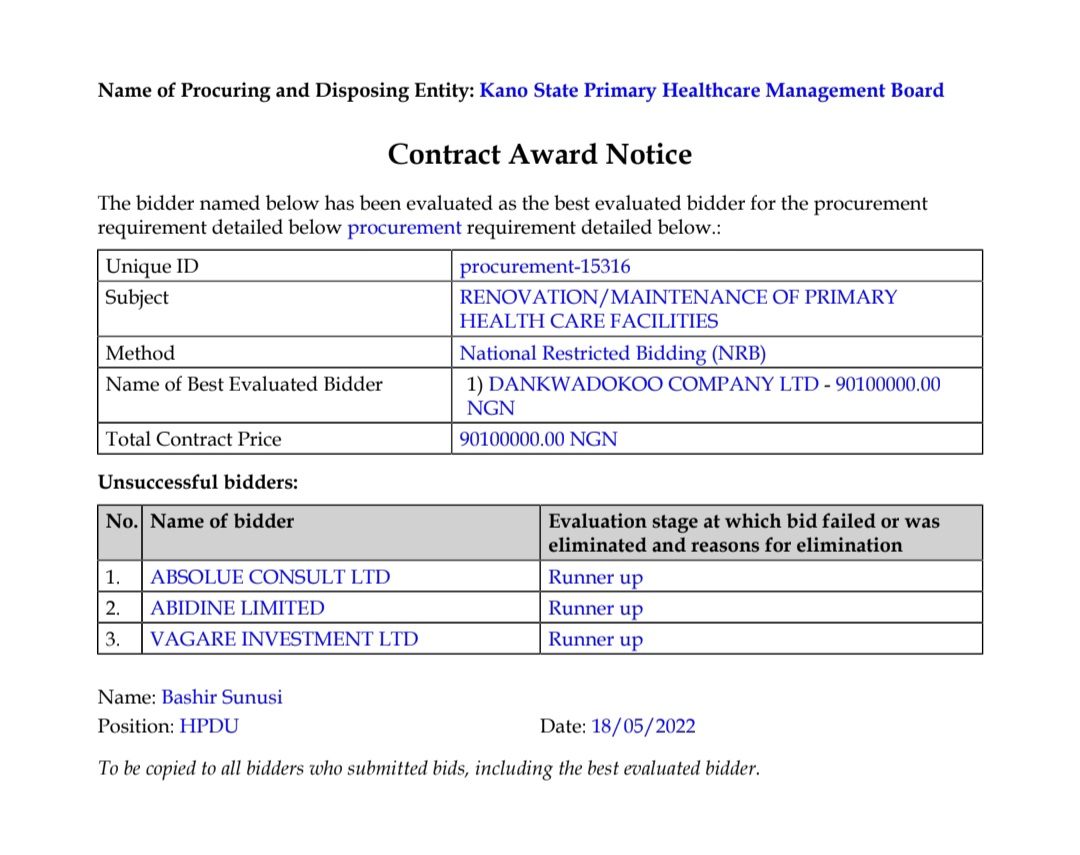
However, in an interview with our reporter, Bashir Sanusi, who was surprised to see his name in the contract award document noted, that he is not and has never been the Head of Procurement Department Unit of KSPHMB but instead the Director Planning, Monitoring and Evaluation of the Agency.
He noted that “Since 2020 the KSPHMB has not executed any renovation project of PHCs in Kano or called for any bidding regarding PHCs projects, adding that KSPHMB is not aware of the contract to Dankwadoko Limited and that he has never heard of such a company name.
According to Sanusi, “The KSPHMB does not adopt the national restricted bidding but we adopt the national competitive bidding by advertising our bidding in two national dailies (Daily Trust and The Guardian) making it open for eligible and registered companies.
“So, I am not aware of such a contract, maybe someone else just designed the document, but the KSPHMB did not execute any renovation in 2022.”
When contacted by our reporter, the Head of Procurement Department at KSPHMB, Muhammad Sagir Nasir, claimed that the Board “have never uploaded any contract award notice or called for bidding on the Kano state procurement portal.”
“All I can remember was we underwent training by the World Bank on how to use the procurement portal but we have never used it.”
Both officials of the Board were of the view that the contract award document may have been forged.
Our investigation, however, shows that Dankwadoko Company Limited which purportedly won the contract does not exist under the law as it is not incorporated by the Corporate Affairs Commission (CAC).
Interestingly, the other three companies – Absolute Consult Limited, Abidine Limited, and Vagare Investment Limited – which lost out in the bid process, according to information on the procurement portal, are all duly registered with the Commission.
A trip on Monday, December 16 to verify the authenticity of the addresses given by two companies Vagare Investment, Plot 145, Adetotokunbo Ademola Crescent, Wuse Zone, 2, Abuja FCT, and Abidine Limited, no 8, Owerri Street, Gwarinpa, FCT, Abuja showed that none of the companies has offices in the said address.It took hours on the long stretch of Adetotokunbo Ademola Crescent, Wuse Zone, 2, Abuja FCT to locate plot Plot 145 which is supposed to house Vagare Limited.
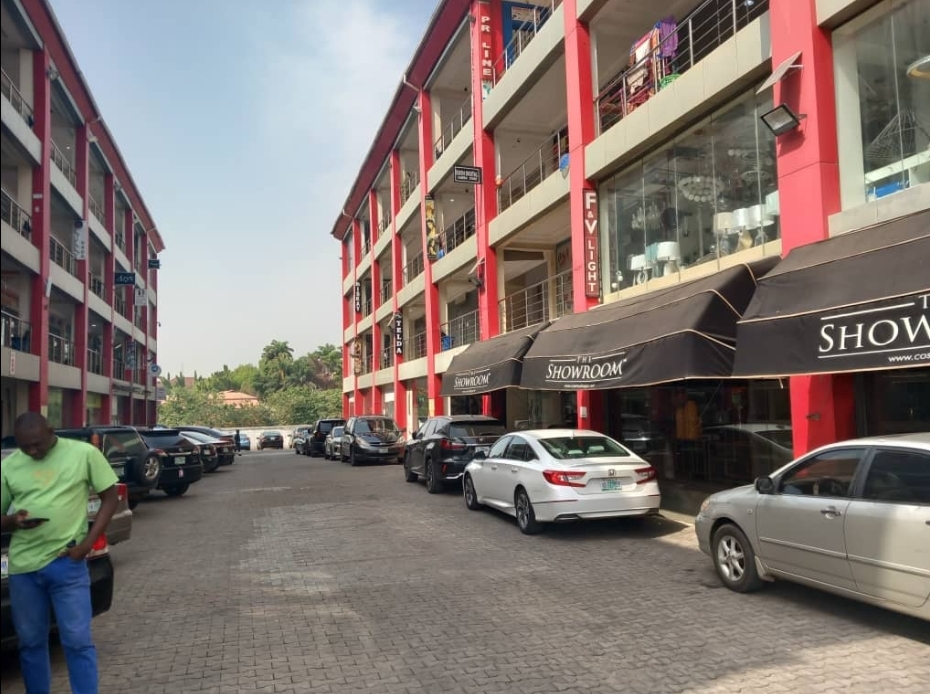
After a few hours, I finally located Plot 145, Adetotokunbo Ademola Crescent, Wuse Zone, 2, Abuja FCT which is directly opposite Oti Carpets.The building on plot 145 Adetotokunbo Ademola Crescent, Wuse Zone, 2, Abuja FCT is a 3-storey building that houses several business outlets.
The building has more than 50 shops. A search round all the shops/business offices around the building which took hours showed that there is no business with the name Vagare Investment in the building.
One of the security men who helped in looking for Vagare Investment on the building confirmed he had never heard such a name before.”I am not sure of that name, never heard it before here,” he said. At no 8, Owerri Street the purported office of Abdine Limited, it took several hours to locate the street, tucked inside National War College Estate in Gwarinpa.
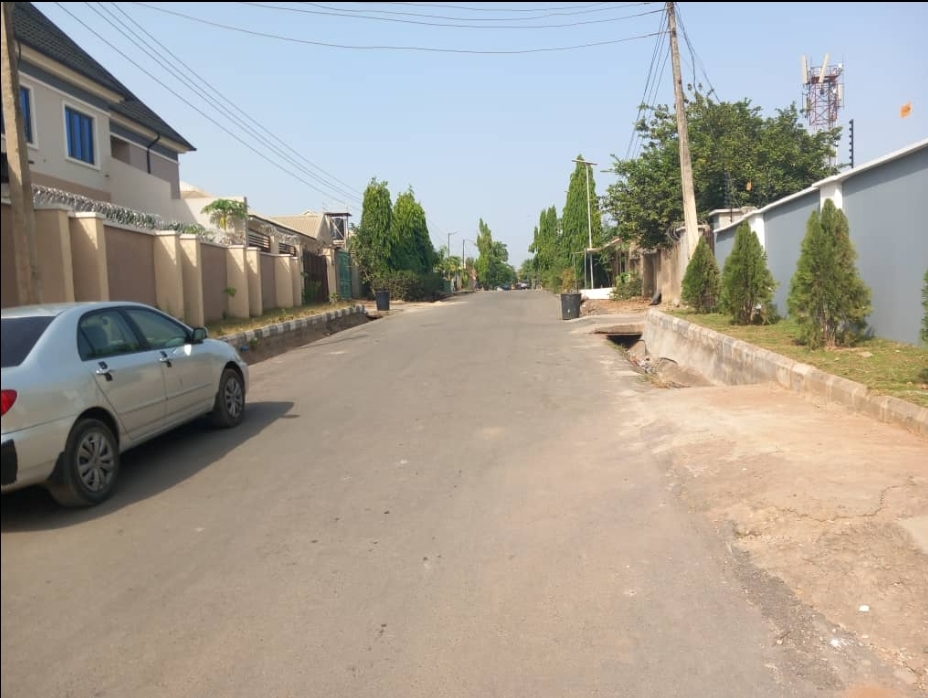
On arrival on the street, it was observed that the street was purely a residential area.
A search for number 8, took us to a residential bungalow. A knock at the gate of the building brought out a woman, who looked like a domestic staff and a security man. Upon inquiry, it was discovered that the building is a residential building and the security man confirmed that he had never heard of the name, Abidine Limited before.
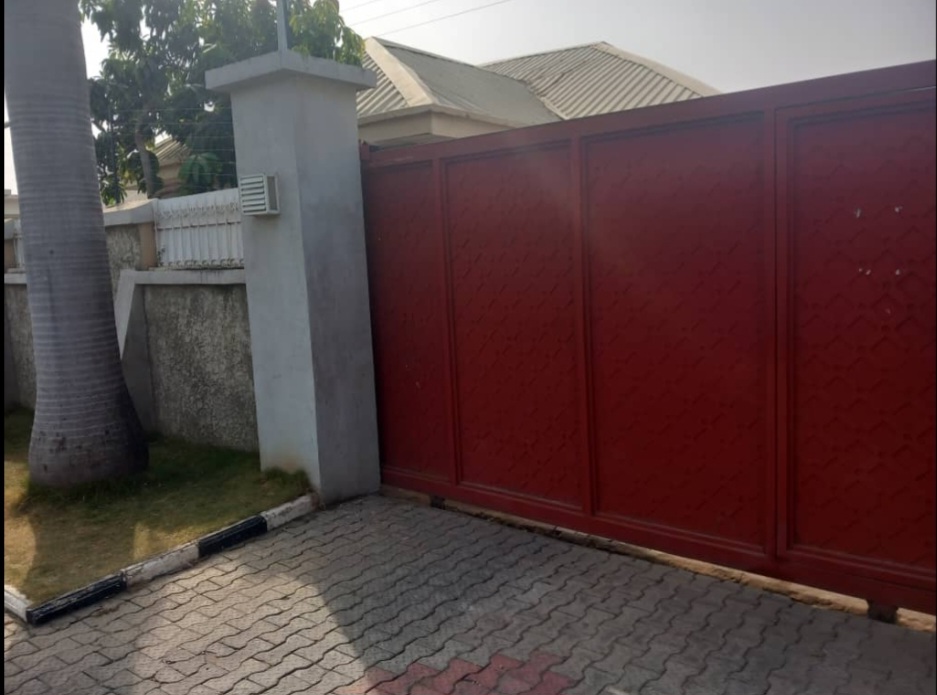
In conclusion, the two companies, Vagare Investment, and Abidine Limited do not exist at the given address.
Furthermore, awarding of the contract to Dankwadoko Limited is a clear breach of Section 31 (2b) of Kano State Public Procurement Law (KSPPL) which states that “All bidders shall fulfill all their obligations to pay taxes, pensions, and social security contributions.”
Isah Abdulazeez, a lawyer and procurement expert, observed that the award of contracts to unregistered companies like Dankwadoko Limited is a clear violation of Kano State Public Procurement Law, a practice which he lamented procurement entities use to siphon public funds.
Further investigation also shows there was no advertisement for the contract, which violates Section 45 (1) of the Kano Public Procurement Law requiring that contracts should be advertised and published in the two national newspapers and one recognized international newspaper.
Apart from violating procurement laws, the non-execution of PHC renovation projects by unregistered companies undermines the objective of Sustainable Development Goal #3- Good Health and Well-Being for All. Besides, its grave implications are evident for all to see in the PHCs in Kano covered in this report.
The World Bank estimates that for Nigeria to meet the goals of SDG 3 by 2030, it needs to allocate 14 percent of its Gross Domestic Product to the Health sector.
Kano Primary Healthcare Management Board keeps mum
On June 19, 2024, this reporter visited KSPHMB, the awarding entity, to enquire why the contract of renovation was awarded to a nonexistent company. After about two hours of waiting, the reporter was told that the Executive Director was not in the office.
On July 4, 2024, a Freedom of Information Act, FOIA, request was sent to KSPHMB, but it has been greeted with silence from the agency, despite repeated calls and follow-ups made. The FOIA request specifically asked for details of the contract award, procurement process, and verification of the company’s existence.
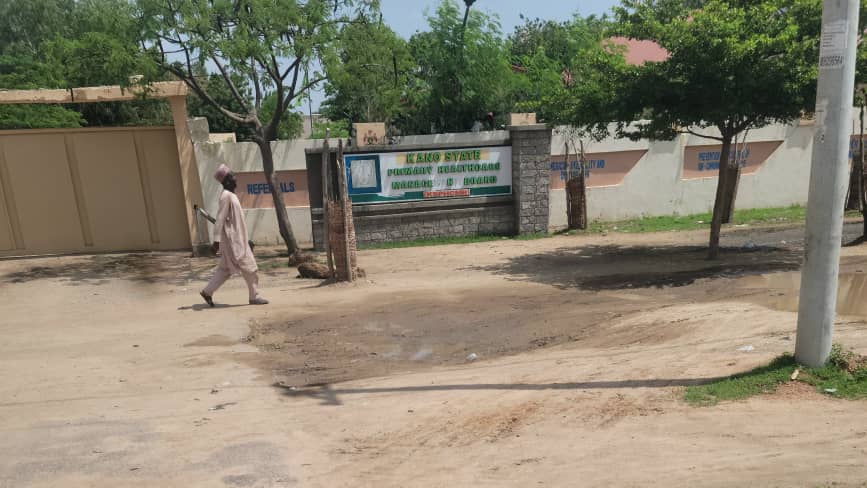
On July 22, 2024, this reporter tried to get in touch with the Board again but was sent from one office to another. However, a staff member who sought anonymity advised the reporter not to waste his time as “nobody will answer your FOIA, they will keep you waiting till you get frustrated”.
In response to the reporter’s question about awarding a contract to a non-existent company in clear violation of the state’s procurement laws, the source claimed that awarding contracts in breach of the state procurement law was “normal” at the agency.
“I have seen situations where contracts are awarded to ineligible contracting entities just to loot public funds, so nothing can be done, awarding contracts to nonexistent companies is normal. Therefore, my friend, don’t waste your valuable time; nobody will answer your request for information or give you an interview to discuss your claims”, he added.
Kano Ministry of Health Shuns
On December 3, 2024 a visit to the Kano State Ministry of Health, which is supposed to supervise the activities of the KSPHMB, the ministry’s Public Relations Officer, Ibrahim Abdullahi, said he has no power to speak on the contracts.
However, Abdullahi told this reporter that he will brief the Kano State Commissioner of Health, Dr. Labaran Yusuf Abubakar, on the contract for the renovation and maintenance of PHCs. After a series of follow-ups, the PRO told this reporter that he does not know when the commissioner will respond.
Numerous phone calls were placed to the commissioner on December 4 and 5 to discuss the contract that KSPHMB awarded to Dankwadoko Company Limited, but none of the calls were answered.
This investigative report was done with support from the John D. and Catherine T. MacArthur Foundation and the International Centre for Investigative Reporting, ICIR.
